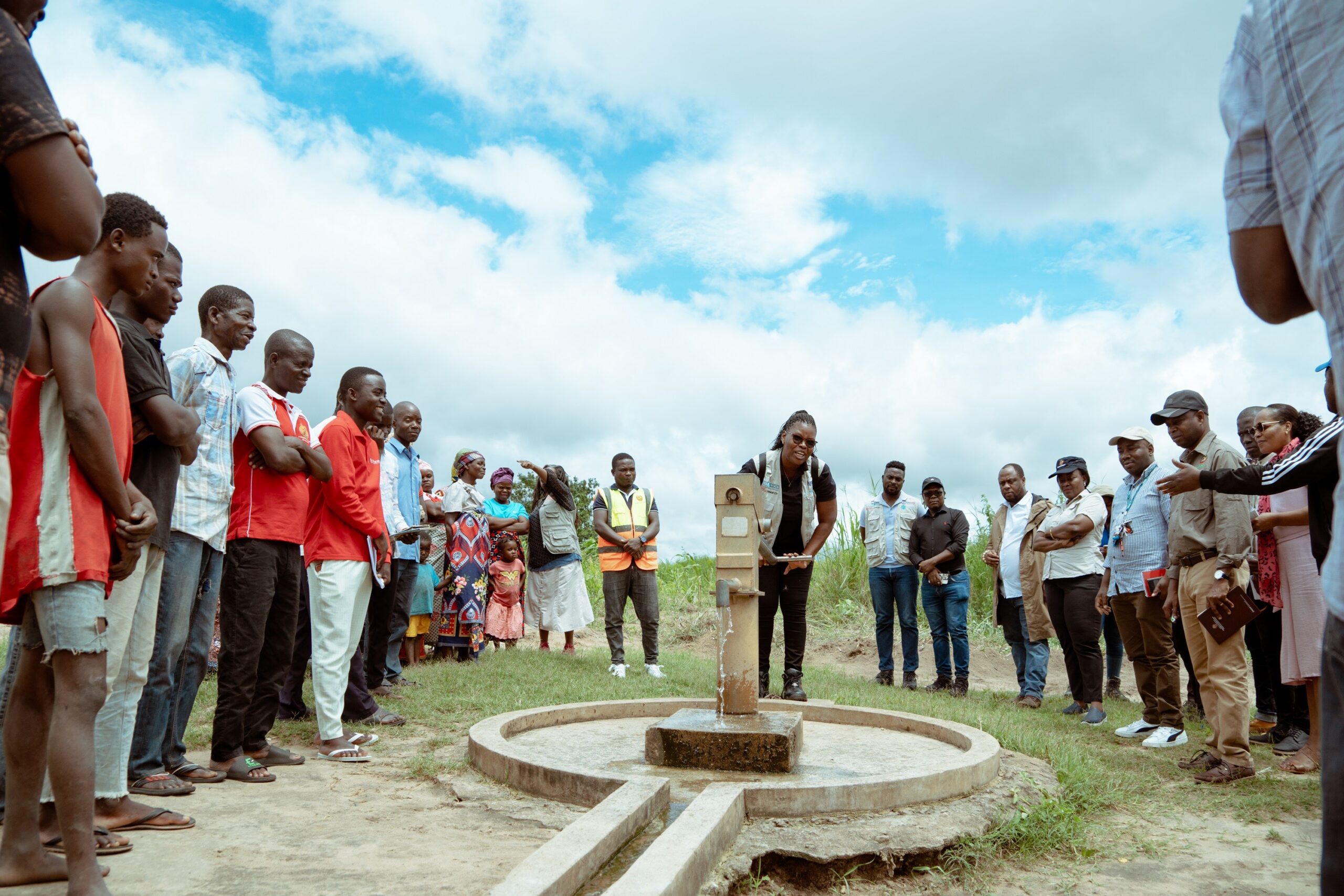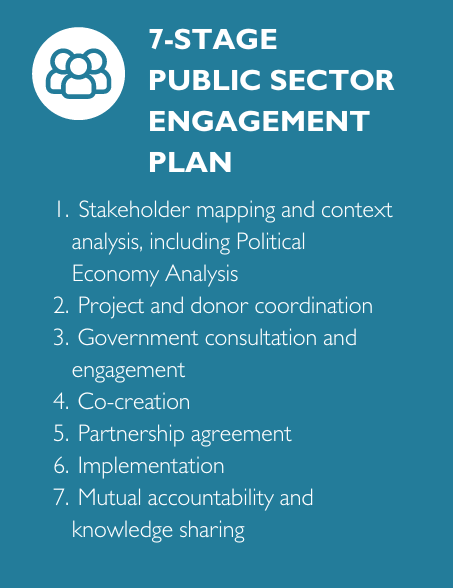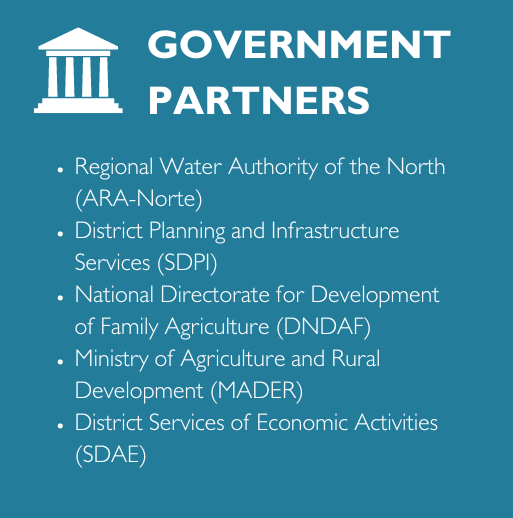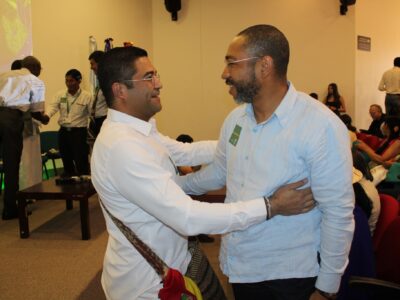
About this Series
ACDI/VOCA integrates thinking and working politically (TWP) into our inclusive market systems (IMS) approach to development in a way that facilitates system-level changes that are politically smart and feasible. TWP is an approach of the U.S. Agency for International Development (USAID) and others that stresses the importance of understanding the local context (“thinking politically”) to help communities create sustainable change (“working politically”). After all, a community is heavily influenced by its local interests, values, power dynamics, and motivations. TWP recognizes the power politics have on which technical approaches work and which do not.
As such, TWP requires a few things: (1) strong political analysis, insight, and understanding; (2) responsiveness to the local context, including by working with and through local stakeholders; and (3) flexibility and adaptability in program design and implementation. These principles are readily integrated into the four phases of ACDI/VOCA’s IMS approach: (1) analyze; (2) strategize; (3) collaborate and facilitate; and (4) monitor, evaluate, learn, and adapt. (Dig deeper into how we integrate TWP into our IMS approach.)
We are pleased to contribute to the growing body of evidence on the importance of politically aware and adaptive development. For our own organizational learning and to improve our programs’ outcomes, we conducted a series of case studies on locally led approaches to TWP in Colombia, Ghana, and Mozambique.
Adaptive Partnerships in Mozambique
This third and final case comes from the Feed the Future Mozambique Resiliência Integrada na Nutrição e Agricultura (FTF RESINA) Activity, funded by USAID and implemented by ACDI/VOCA. The Activity implements a systems approach and TWP mindset to identify and manage politically feasible, multi-sector interventions to advance its shared vision with the Government of Mozambique. This vision involves diversified and climate-smart agriculture production, increased access to clean water through multi-use water systems, and improved nutrition outcomes for women and children under two years of age. The Activity focuses on building trusted, mutually beneficial, and adaptive partnerships complemented by institutional capacity strengthening and coordination building to ensure local ownership.
Public Sector Partners in Mozambique Support Improved Food Security, Resiliency, and Nutrition
Investing in relationships to overcome governance bottlenecks
Improving food insecurity and malnutrition requires integrated, holistic, and sustainable solutions that are locally owned, managed, and led. The Activity addresses complex governance challenges and historically slow progress by building strong, trusted relationships within multiple agencies and administrative levels of the national government with a high influence and interest in improved food security and resilience outcomes.
Context-aware strategies to work effectively with the Government of Mozambique
The Activity developed a seven-stage public sector engagement plan to identify challenges and move forward with joint solutions with government stakeholders.
Stage 1
The Activity engaged government partners early in its inception to inform its strategies in areas like food environments, agribusiness value chains, political economy and power dynamics, and gender, youth, and social inclusion. This participatory, analytical process allowed the Activity to find entry points for scalable, politically feasible strategies with strong government ownership. Understanding incentives, priorities, and decision-making power within key government institutions meant more efficient co-design and co-implementation processes at levels unseen in Mozambique previously.

Stage 2

Based on stakeholder mapping and political economy analysis, the Activity determined it imperative to establish a team dedicated to identifying, developing, and managing relationships with key government partners. As a result, the Activity and institutional stakeholders have experienced more consistent and efficient communication, leading to improved coordination, reduced duplication of efforts, and better sharing of data and evidence.
Stage 3
Cultivating focal points within the government at the national, provincial, and district levels accelerated dialogue and buy-in, led to mutual alignment of priorities over time, and allowed for consistent external messaging. Focal points became internal champions of joint initiatives, advocating within government agencies and troubleshooting risks.
Stages 4-6
Co-creation involving public, private, and civil society organizations actors resulted in jointly designed interventions, agreements, and implementation plans. Strategies centered around developing food security and climate change adaptation capacities using appropriate innovations, affordable water solutions, and nutrition-sensitive agriculture. The Activity established steering committees for each major partnership activity to promote concrete partnerships, lead cross-sector governance issues, set the strategic direction, promote alignment of cross-sector partners, and support mutual accountability frameworks.
Stage 7
The Activity maintains continuous engagement with government entities at all levels to be informed of (and to inform) economic, political, and social interventions of mutual interest. This engagement brings in focal points and champions to help address specific development challenges and promote transparency, joint accountability, and co-ownership.
Strong, responsive partnerships produce improved resilience and resource management outcomes.
The overall goal of these partnerships is to address issues facing food security, resilience, and nutrition in Mozambique. Efforts focus on improving information systems, education plans, dialogue and governance structures, value chains, market linkages, gender and social inclusion, and water quality.
For the latter, the Activity developed a Water Quality Assurance Plan, following root cause analysis and capacity building with ARA-Norte and SDPIs, to improve national resource management and communities’ quality water access by rural communities. In partnership with the government, 25,000 farmers upgraded their climate change adaptation skills in areas like knowledge and implementation of good agricultural practices, uptake of climate-smart innovations, and ability to overcome shocks and stressors. With SDPI’s support, the Activity also rehabilitated 54 water points, developed the capacity of local mechanics, and set up water committees, resulting in access to basic drinking water to 27,677 people.
Learn more about the FTF RESINA Activity here and here.
Don’t miss the first two blogs in this series, featuring projects in Colombia and Ghana.
For questions, comments, or inquiries, please contact Ydun Donahoe (ydonahoe@acdivoca.org).
Comments










